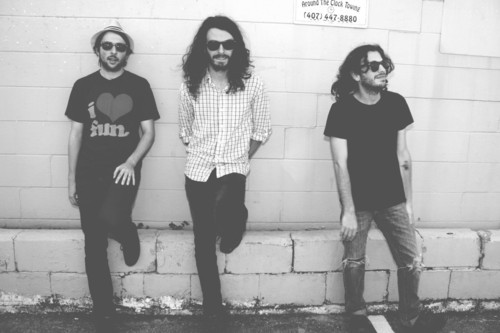Writers On Process with Keith Goodwin

It’s a good thing that Keith Goodwin of Good Old War is disciplined in his songwriting process (most of the songwriters I’ve interviewed are, in their own words, not disciplined). His wife is due with their first child in October, so he’s only got a couple more months of solitude in the house. We have four young kids, and as I told Goodwin, being a parent has actually made me more disciplined: I have limited free time, so I know not to waste the little time I do have. Parenting enforces discipline on the writing process. But as you’ll read, this may all be for naught, because in true Pavlovian fashion, it appears that all Goodwin needs to get himself writing is a good ol’ slice of pizza.
Good Old War’s most recent release is their self-titled album on Sargent House. Read my interview with Keith Goodwin of Good Old War after the video.
I was reading your biography on the Good Old War website, and like many songwriters I’ve talked to, you mention Charles Bukowski as a favorite author. What about him appeals to you?
He has a pretty brutal style, and it’s shocking. I wasn’t sure if I could finish the first book I read of his; he was talking about some crazy stuff. I had never read anything like that. It was so graphic and disgusting.
Not that the disgusting stuff makes it into your lyrics, but is there anything about his writing that influences your songwriting?
Not too much. I try to be honest and have a cool personality like that, but not in the same kind of way he does.
Who else do you read?
I like Herman Hesse a lot. And I just read One Hundred Years of Solitude by Gabriel Garcia Marquez. He’s amazing. And at some point I started trying to write lyrics like Kerouac, those long thoughts; he’s probably the only author where I thought, “I’ve got to try and do something like that.”
Do you have a somewhat typical songwriting process?
Sometimes I pick up a guitar and play a couple of chords that I like, then create a basic structure for the song and think up the lyrics right there on the spot. I’ll refine the lyrics later before I bring them to Tim and Dan and know they are going to do great things with the melody and rhythm.
When do the lyrics come in?
Lately, I’ll come up with some gibberish for the verses but sing something meaningful in the chorus, something that I really want to say. If it sticks with me, I write the verse around that. I can finish a song in anywhere from a half hour to two hours like that, just sitting down and really focusing on it.
How often do you sit down with the express idea of writing a song about a specific topic?
Not too often. A thought to do it crosses my mind every day, but when it really hits me and I decide to write a song, that happens once every couple of weeks. I’ve been writing a lot of songs on Logic Pro right now. My wife is pregnant and due in October; we have a small house and she needs her sleep, so I can’t be up playing music too late. I put on my headphones and make some cool songs with my MIDI keyboard. Some of those songs turn into Good Old War songs, but others just sound like hip-hop beats. I can sit there and finish a beat or pattern in one sitting. I do that almost every day, especially when I’m bored. I’d rather do that than watch TV.
Do you find that your song topics are changing now that you’ll be a father soon?
Definitely. I saw Jared Diamond give a talk at UCLA once, and he said that he’s always thinking about his children and grandchildren and how to make the world better for them. That was seven or eight years ago, but I’ve always remembered that. I’ve always wanted to say something important in every song that might help my children or grandchildren. Now, of course, it’s even more important.
When you write lyrics, are you willing to sacrifice a word here or there, maybe some that you really like, for the sake of the melody?
Definitely. Since I work with two other songwriters, they have to be happy with what I’m saying. Usually, our process is such that if they think we need to change a song, we change it. It’s not a big deal to me. But sometimes if there is something specific I’m trying to say from a line they want me to change, they’ll help me come up with a better way to say it. I’m very open to revising.
Do you work well with deadlines?
It’s funny, at first when I hear we have a deadline, I start getting some anxiety. All day long, every day, I’m writing songs if we need to write something in a certain amount of time. I start to get nervous, but once I get to work the anxiety goes away.
Would you call yourself a disciplined writer?
I am pretty disciplined. Part of it is because I’m having a child soon. I also know that since I’m lucky enough to be able to focus all day, every day on music, I should be doing something productive, whether it’s practicing or writing. I’ve been trying to learn the piano, and Dan is trying to learn some other instruments. Learning songs on other people’s instruments helps me as a songwriter. You learn their tricks, how they shape their chords.
Many songwriters tell me that when they are in a rut, playing other people’s songs helps free them.
That’s true, but often if I feel like I’m struggling, I take a break and start again tomorrow. I’m in a good spot because if I do get stuck on an idea, I have two people to run it by that I can trust, who can give me a spark.
How important is your physical environment when you write?
What really matters is that I’m alone. If my wife is around, I have a hard time writing unless I go to a different room. Since there’s a lot of that gibberish involved in my songwriting, I start feeling awkward if I’m saying the same gibberish over and over and she can hear it. I tense up and the ideas don’t flow as well, so I like to be alone.
Do you run any of your songs by your wife first?
When I finish something, I’ll show it to her. If she’s not thrilled with it, I really don’t want to show it to anyone else until I’ve done something with it. Usually she says she loves it, but I don’t know if she’s saying that just to be nice. Laughs.
What are some of the things you do to get inspired?
I watch a lot of good movies. I follow Roger Ebert and see what he likes. I wrote a song the other day after watching Midnight in Paris, a Cole Porter style song. Usually I know what want to do and don’t have to go looking. It’s just random ideas that pop into my head.
I’ve been making music since I was twelve, and having made a bunch of songs and listened to many more than I’ve made, I should have a bunch of ideas when I write. Every day I hear a song where I think, “I should do something like that.” There’s always something that I want to be doing, whether it’s with a beat, or instrumentation, or anything. That never stops happening with me.
And it seems like the songwriters who have been around the longest treat it like a job.
In order to do it for a long time, you have to treat it like a job. I was in another band before Good Old War with Tim, our drummer, and all we really cared about was making cool songs and getting drunk. When we started taking it seriously is when we started this band. We learned from our mistakes and did it the right way with Good Old War. That’s why we have three members instead of six. We are all capable of playing our instruments and generating a big enough sound that we don’t need three more opinions. It makes it easier when it comes to songwriting.
Do you get a lot of writing done on tour, or is that the time when you refill the well?
It’s really a way to refill the well. It goes back to the whole idea of being around poeple all the time. It’s hard to write something when people are constantly around. Sometimes we write songs together for fun, but touring is when we read books and listen to a lot of music.
What have you learned about yourself as a songwriter from your bandmates?
I usually write stuff that’s pretty straightforward and literal. You know where I’m coming from. But Dan writes stuff with more imagery that’s kind of vague. We have different styles, and I’ve learned to bring some of his style into my music. Tim has a great voice, so when he wants to change a line, he’s good at coming up with a good line on the spot. I write something more deliberate and he is more carefree, so he’s really taught me how to create stuff like that on the spot.
Tell me one of your revision techniques.
A lot of my revisions happen because I end up singing a different word that I had written down, and the one that I sang just sounded better in the song.
It sounds like you guys work well together.
Yeah, and I think what helps is that we’ve always agreed on a lot of things from the beginning, and that comes out in the attitude of our songs. We trust each other. Having other people’s opinions is fantastic.
What was the easiest song you’ve written in a while?
It’s not out yet, but one of the songs on the new record. I wrote four songs for that record, pretty much all in the same day. At some point that day, I decided to get a slice of pizza. As I was walking out the door, I had a melody in my head, probably because I had been working on music all day long. Then just as I got outside, a line popped into my head, and I realized I had to write the song then. So I went back inside and wrote it in 30 minutes because I wanted pizza so badly, but I wasn’t going to leave until I had finished the song.
What about a song that was really hard to write?
There’s a song that will probably be on the new record that I’ve had for three years. We tried it so many different ways, and it never worked. I almost gave up, then our manager wanted us to try working with another songwriter. We did it to make him happy, so we met with this guy in LA and told him about the song, and within 30 seconds he wrote this amazing part. I don’t like to give up, but what I’ll do is give a song a break, even a long one, and come back to it with a fresh set of ears, either mine or someone else’s. It’s amazing what others catch in something that you write, something that you never would have caught in a million years because you’re too close to it.
By Benjamin Opipari, Ph.D.
CLICK HERE TO READ MORE GREAT INTERVIEWS AT SONGWRITERS ON PROCESS


